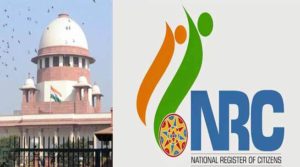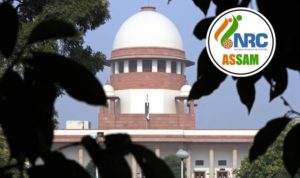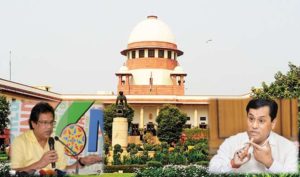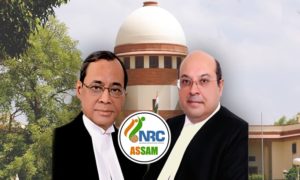AnalyticsBreaking News
NRC: Supreme Court rejects Hajela’s views, allows 5 documents


-DHARMANANDA DEB, Advocate
As per direction of Supreme of court of India dated 19th September,2018, State NRC Coordinator Mr.Prateek Hajela has submitted two reports; one in sealed cover and the second report dated 4th October, 2018 contains, in details, the 175 page long report contains 50 pages / 18 paragraphs pleadings and the rest portion of the report is Annexure. Relying on five documents for filing claim, Prateek Hajela affirm and state before the SC as State Coordinator for NRC & Principal Secretary, Home & Political Department, Government of Assam that “apprehension of misuse”. the State Co-ordinator, NRC has commented by raising objection on permissibility of submission of additional Legacy Data ( NRC-1951 and Voters list up to midnight 24th March, 1971 ) without change in Legacy person and family Tree. As per his Report, Hajela feels that even freezing of the Legacy Person may not be able to prevent possible misuse of Legacy data.

This suggestion belatedly into the NRC process, being made by Hajela is a gross violation of NRC Rule-2003 which states that, ‘NRC will be updated on the basis on of NRC-1951 and Voters list up to midnight of 24th March, 1971. All people, including their descendants whose name is in NRC-1951 and Voters list up to midnight of 24th March, 1971 will be included in the updated NRC.’ These two documents are in a sense the heartbeat of the Assam Accord of 1985 and at this stage Hajela betrayed the Assam Accord also.

The Hon`ble Supreme Court today opined that- “the documents listed at Serial Nos. (i) and (ii) i.e. names in NRC,1951;and names in Electoral Roll upto 24th March, 1971 is based entirely on a possibility of abuse which, however, strong, cannot be an acceptable reason in law to exclude the documents from consideration. It would, undoubtedly,be the duty and obligation of Shri Hajela to ensure a thorough verification of the claims that would now be made for which purpose we would be suitably framing the time schedule for consideration of the claims that may be filed.”

Prateek Hajela has also raised some issues and complications which may arise if the Legacy Data is allowed in the process to file claim applications. To substantiate this, in the paragraph 2A(a), (b) and (c) of the Report Prateek Hajela gives three examples: that of the cases of Nilkanta Barman (His Legacy Data Codes of three years-1951,1966 and 1971), Ramesh Talukder (His two Legacy Data Code, one of 1951 NRC and another Electoral Roll of 1970) and Dilip Bora (His name also appears twice one Legacy Data Code of 1951 NRC and another Electoral Roll of 1966) .

In paragraph 3 and it’s Sub-paragraphs of his second Report, Hajela has tried to establish that Refugee Registration Certificates and Citizenship Certificates including its variants not be allowed for the Claim applications due to large scale forgery of such documents. Hajela cites the below mentioned figures :-
(a) Out of the 94, 77,152 birth certificates submitted as Linkage Certificates (B List documents), 1, 78,601 (1.8%) are reported to be forged;
(b) In case of the Refugee Registration Certificates 112 out of 1,43,714 (0.08 %) documents reported to be forged;
(c) In case of Citizenship Certificates, 376 out of 66,559 documents the percent of forgery is 0.56% only.
(d)In case of certified copies of pre-1971 Electoral Rolls from Tripura submitted as List A document 1,057 (11.3%) out of 9,322 are reported to be forged.

So, it is clear from the above figures, the NRC co-coordinator’s own admission, percentage of forgery of Refugee Registration Certificates, Electoral Rolls and Citizenship Certificates is low in comparison with Birth Certificate. In this regard, the Hon`ble Supreme Court today opined that- “the mere possibility of filing of forged documents or that such documents were filed in the earlier exercise cannot be a ground to exclude the same from the impending process of filing of claims and objections. Needless to say, all such documents must be subjected to a thorough process of verification and would be accepted only after due and complete satisfaction of the genuineness of the same.”

The fifteen eligible documents, also known as List A, are essential for establishing the presence of the applicant or an ancestor in Assam before 1971. So the Supreme Court has asked the Centre, the Assam government, Petitioner (NGO) Assam Public Works and seven other stakeholders to submit their views on the above report submitted by Prateek Hajela, the state coordinator of NRC, where he explained why only 10 of the 15 documents that were initially accepted to establish residence in Assam prior to March 25, 1971, could be submitted afresh in the claims and objections phase. The stakeholders have been asked to file their objections in writing, by October 30 and the bench has fixed the day on today i.e. 1st November, 2018 for hearing and issue an Order in this regard.

To enable all the stake-holders to respond to the stand taken by Shri Hajela in his report dated 4th October,2018, which would require a deep insight into the mechanism of the manual family tree as well as the computer family tree which is the basic exercise that was undertaken before preparation of the final draft NRC, the Hon`ble Supreme Court direct Shri Prateek Hajela, learned Coordinator, NRC, Assam to give a power-point presentation of the manner in which he had proceeded in preparation of the manual and the computer family tree for the purposes of deciding on the inclusion of names in the draft NRC. As per direction of Supreme of court of India, State NRC Coordinator Prateek Hajela made a power point presentation (PPT) in New Delhi on two days. Hajela presented the PPT before Solicitor General of India Tushar Mehta, State Chief Secretary Alok Kumar, State Commissioner L S Changsan, Senior advocate Kapil Sibal who represented all other stakeholders, among others.

Accordingly, the Assam Government, Petitioner-Assam Public Works has filed an affidavit in the Supreme Court respectively seeking inclusion of the five documents for establishing the legacy by the 40 lakh persons excluded in the final draft NRC, amongst others.

Upon hearing, the Supreme Court re-framed the schedule and to approve the Standard Operating Procedure (S.O.P.) filed by the Government of India, Ministry of Home Affairs dated 13th August, 2018 as modified on 17th September,2018 and fixed December 15 as the deadline for filing of claims for inclusion of names in Assam National Register of Citizens (NRC). The Court also fixed 15th January, 2019 as the time for issuing notice after digitization and completion of all formalities and requirements. The Court also allowed claimants for NRC to rely on five documents which were objected to by NRC coordinator as discussed above subject to “vigorous process of verification”. The five documents are:- (i) Names in NRC, 1951; (ii)Names in Electoral Roll upto 24th March, 1971; (iii)Citizenship Certificate; and Refugee Registration Certificate; (iv)Certified copies of pre-1971 Electoral Roll, particularly, those issued from the State of Tripura; and (v) Ration Card. The court also fixed the date on 1st February 2019 for Commencement of the verification process.




